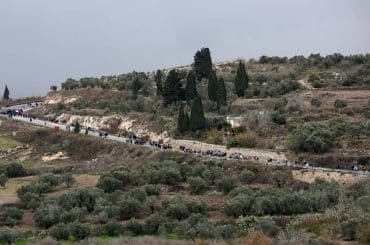This is part of Marc H. Ellis’s “Exile and the Prophetic” feature for Mondoweiss. To read the entire series visit the archive page.
I remember many years ago when the demise of religion was seen as inevitable. Obviously, in the last decades there’s been a reversal of that understanding. Now the question is whether we will survive the revival of religiosity.
For those “I’m above religion” folks the wake-up call is obvious. Of course, most secular people have a religion of their own – call it secularity. If there’s worship more fervent than the idols of modern life, it would surprise me. Whether we will survive secular religion – modernity – is debatable.
The evolving Egyptian religious conundrum is a fascinating case study of the combination of the religious and the secular. As both Hosni Mubarak and several leaders of the Muslim Brotherhood were in court yesterday for their political roles in the events of 2011 and 2013 respectively, the Egyptian military is dealing with potential difficulties in their ranks. What does it mean for a military filled with Muslims to rein in, torture and kill fellow Muslims, especially when they are protesting under Islam’s banner?
It’s a religious issue. It’s a political issue. It’s also personal. With over a thousand protesters killed and thousands more injured, many ordinary Egyptian conscripts have family or family connections impacted by this violence. What are these soldiers to think – and do – when the military they belong to systematically hunts down people they know and love?
The New York Times is on this story. The idea it seems is when one side, say the Muslim Brotherhood, is holding Islam high, the other side, say the military, has to hold Islam equally high. Or low, as the case might be.
The fear is insubordination in the ranks. What if Muslims in the military find their way to the Muslim Brotherhood? The Times begins with the problem facing the military:
The recourse to religion to justify the killing is also a new measure of the depth of the military’s determination to break down the main pillar of Mr. Morsi’s support, the Islamists of the Muslim Brotherhood. Indeed, after ousting Mr. Morsi in the name of tolerance, inclusiveness and an end to religious rule, the military is now sending religious messages to its troops that sound surprisingly similar to the arguments of radical militants who call for violence against political opponents whom they deem to be nonbelievers.
Yes that’s how it goes, doesn’t it? When you mistake political opposition to your rule for a religious battle of light and darkness, you have no choice but to take up the call of your opposition as your own. The Times is vivid in its description:
“When somebody comes who tries to divide you, then kill them, whoever they are,” Ali Gomaa, the former mufti appointed under President Hosni Mubarak, is seen telling soldiers in a video made by the military’s Department of Moral Affairs. “Even with the sanctity and greatness of blood, the prophet permits us to fight this,” he said in the video, likening opponents of the military takeover — implicitly, the Brotherhood — to an early Islamic sect that some scholars considered to be infidels, and thus permissible to kill. Mr. Gomaa later said the military had shown the video to troops and riot police officers across Egypt.
In a video against the same backdrop, Salem Abdel Galil, a former senior scholar in the ministry that oversaw mosques under Mr. Mubarak, appeared to say such opponents were “aggressors who have to repent to God.” They are “not honorable Egyptians,” he said.
The religious rhetoric sounds familiar. Anyone who has followed Settler Judaism over the years knows that rightwing rabbis use more or less the same demonizing language adjusted for Jews, Judaism, Israel and Palestinians. In Jewish circles demonizing the external and internal opposition can take place in non-religious language as well.
Perhaps the question isn’t religion per se but rhetoric of any kind that demonizes and defines fellow human beings as Other.
In Egypt, the Muslim Brotherhood has been defeated – at least for now. Whereas a few weeks ago the mobilization in Egyptian society seemed perpetual with the ultimate winners and losers to be determined, slaughtering civilians with advanced military hardware has taken its toll on the protestors. Yet as in all of life, the defeated bides its time. Continual pressure has to be applied to keep the memory of injustice from causing dissent – and insubordination – in the ranks.
Othering the defeated is a fulltime job. It seems that insubordination is as well.


“Perhaps the question isn’t religion per se but rhetoric of any kind that demonizes and defines fellow human beings as Other.”
Precisely. Secular Zionists need not believe in the Torah or Talmudic law in order to support the extirpation of Palestinians from their homeland.
Egyptian liberals can be moderately religious yet their hatred of the Other can be as violent, indeed more violent, than that of their fundamentalist opponents.
This is a lesson that Western progressives should take on board as well. Why, after the experience of 20th century communism, or Stalinism if you prefer, it’s possible to still pretend that secular people have some monopoly on virtue is beyond me. In the meantime I’m increasingly disturbed by the anti-religious rather than secular pluralistic position that progressives and liberals have taken in the West. Consider – when you constantly dismiss your opponents as “crazy” and “fanatical”, how far are you from adopting the Manichean mindset of Egyptian liberals? Learning how to empathize with your opponents and to be able to engage civilly with them is one of the most difficult and essential skills requisite for a democratic society.
Yeah, another example is that the Cable TV infotainment news is, under the mask of just asking questions (to their selected pundits), allowing our airwaves to be filled with praise of attacking Syria, to save the Syrian people, to uphold a civilized red line, to stop the terrorists, and all this includes an unstated plea to arm 9/11’s Al Quaida (once again) because the enemy of our enemy is our friend, and, as usual better to fight over there than over here. PNAC is a religion, or rather, an ideology endemic in the most powerful of our American leaders. And, why it’s practical strategy too a la McCain’s insistence if we don’t enforce Obama’s redline (Assad’s use of WMD), the USA will lose all credibility in the world. The US is more than inching towards the fracturing of Syria as I type, and next in line Syria’s back door, Iran will be fully open–PNAC is alive and well, and on course, with no more than a few more bumps in the road. After all, as our leaders say, the US and Israel have the same values. Too bad for the rest of the world.
To my mind there is something inherently frightening about views of religion (to include atheism) that you don’t share. Here is someone who has thoughts you can’t think, so is (s)he human in the same way you are? It would be nicer if that person went away and didn’t bother you with this problem.
The more I learn about the criminal state of Israel, the more astonished I am that no amount of international opprobrium, UNSC condemnation, ICJ rulings, ….has altered the arrogant, murderous, spiteful, duplicitous behavior of this pariah of our international community. The Jabotinsky Iron Wall doctrine can not withstand the accumulating outrages perpetuated against the Palestinans and the world community. Why has not the world Jewish community come to the realization that Israel does not employ the precepts of Judaism, but rather uses it as a subterfuge to gain respect. Judaism=heal the world(Tikkun Olam)=Israel ? Not even close.
Marc,
Your article “Renewing the Prophetic” was published in Sabeel’s online newsletter for early July.
Congratulations.